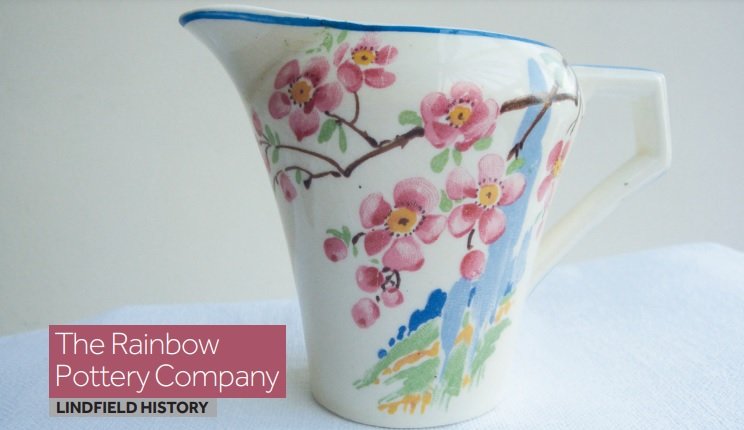By Richard Bryant & Janet Bishop, Lindfield History Project Group
In late 1921, an enterprising woman, Gladys Van Weede established - as sole proprietor - The Rainbow Pottery Company, trading from an outbuilding behind Abbotts Pharmacy on the High Street. Born in Worthing in 1888, she married Rollo Van Weede in 1915. They lived at Pascotts Farm, Sluts Lane, where he ran a dairy farm. According to the 1921 census, prior to founding Rainbow Pottery, Gladys Van Weede worked as an artist for Margaret and Christine Warneford, both artists, at 13 Mill Green Road, Haywards Heath.
Within months, the business was flourishing and commercial travellers secured sales across the country. In April 1923, the Lindfield Women’s Institute held an exhibition of Rainbow Pottery products at the King Edward Hall. Intriguingly, the Mid Sussex Times reported ‘that members of the Institute are responsible for the work. What the ladies really do is to hand colour, by a secret process, Staffordshire Pottery, and the artistic blending of colours on powder bowls, vases and other articles on exhibition was delightful’. It further commented, ‘The fact that any colours can be blended onto any articles of pottery and glass suggests infinite possibilities’.
On 28th November 1923, the company held another exhibition at the King Edward Hall of their ‘Novel HandColoured Pottery, Glass-Ware, Trays, and Tables etc.’ Mrs. Van Weede was assisted at the exhibition by a number of ladies from the upper echelon of Lindfield’s social scene. The hall was decorated with plants and cut flowers and to make the exhibition a social and charitable event, afternoon tea was served and a musical programme performed by local musicians. Fifteen per cent of Rainbow Pottery sales and a share of other proceeds were divided between the Haywards Heath Hospital and the Lindfield Nursing Association.
In 1924, Rainbow Pottery took a major step forward, securing a stand in the palace of Industry Pottery and Glass Section, at the prestigious British Empire Exhibition at Wembley. It was quite remarkable that a small, three-yearold company trading from an outbuilding behind the High Street exhibited at such an event
As well as their hand-decorated products, the company also sold, both retail and wholesale, the Danesby Ware Electric Blue pottery range, manufactured by the well-known Denby Pottery Company.
The Rainbow Pottery Company was acquired by Mr. J.N. Carter, who is understood to have also run the Lindfield Steam Laundry. The date the business changed hands is not known. The company continued selling various pottery items, miniature china animals and also glass and chrome items, such as honey glass table condiment sets, serviette rings and cake stands. They were advertised as being of ‘Special Attraction for Bazaars, Fetes, sales of works, etc.’ A far cry from the British Empire Exhibition.
It is believed Rainbow Pottery ceased trading at the end of the 1930s.
Contact via https://lindfieldhistoryproject.group/ or 01444 482136.

